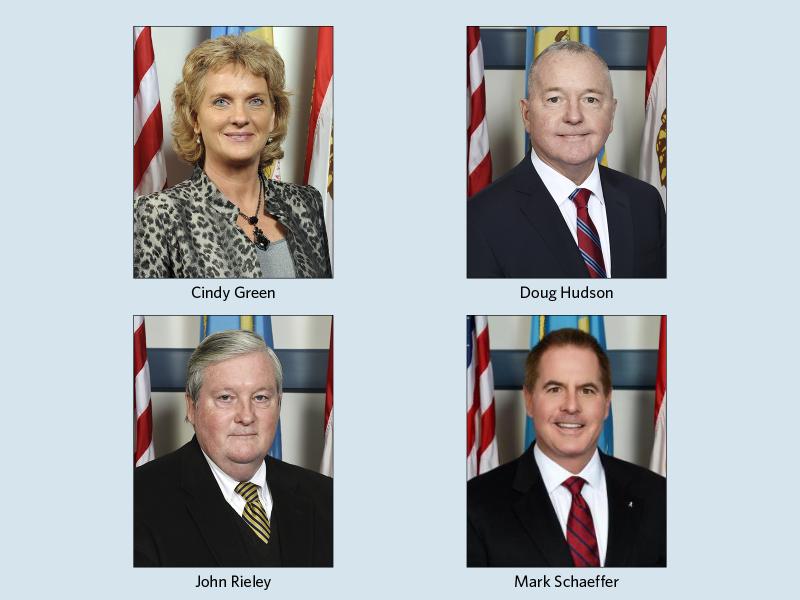Sussex County District 3 Councilman Mark Schaeffer has withdrawn his request to rescind the county accommodations tax after it became apparent during council's Nov. 9 meeting there was not a consensus to write a new ordinance.
Schaeffer's questioning of the tax during the Oct. 26 meeting set off a flurry of back-and-forth comments by council members in the media, and particularly on radio talk shows. During council's Nov. 9 meeting, members on both sides of the issue didn't hold much back in an unprecedented display of candor.
District 5 Councilman John Rieley and District 4 Councilman Doug Hudson said they took exception to and were deeply disappointed with comments in the media made by Schaeffer. They claim his accusations that a deal was made “in the dark of night” to reinstate the tax are false and a personal attack on their integrity.
They said it was clear when the tax was suspended in April 2020 because of the COVID-19 pandemic that it would be reinstated when the Delaware state of emergency was lifted, which occurred on July 13, 2021.
“I hope I never see such a display of poor judgment again. This past two weeks has been an unfortunate stretch,” Rieley said.
Council President Mike Vincent, Rieley and Hudson said they support the tax, while Schaffer and District 2 Councilwoman Cindy Green said they are not in support.
Schaeffer said he did not want to waste taxpayers’ money to go through the process of drafting a new ordinance to rescind the tax without consensus from council.
Schaeffer: More transparency
Schaeffer contends there was no clear action taken to reinstate the tax after it was suspended during the COVID-19 state of emergency. He reiterated that his motion at the May 25 meeting was to defer the tax.
On May 25, the tax was placed on council's agenda to determine if there was interest in reinstating it before the state of emergency was lifted, since there was no clear date when that would occur.
“It's a very confusing issue with an uncertain date. The reinstatement of this tax should have been handled with much more transparency,” he said. “This is my perception, and if I'm incorrect, I will apologize.”
Schaeffer said the tax is disposable income that could be spent at local businesses. He added dredging and beach replenishment, two of the items the collected tax can be spent on, are state matters and should not be passed on to Sussex County taxpayers.
“The $500,000 that has been collected should have been spent at local businesses,” said Green.
Green also fired back, saying the attacks during radio interviews claiming she does not understand the issue or how to read a budget are not true.
“In May, we deferred the tax, and it was listed in the budget as a proposed tax. And a county news release on the budget did not mention a lodging tax,” she said.
Not in dark of night
“Councilman Schaeffer has a lack of understanding on how the county budget operates and how to make a motion,” Rieley said. “Nothing was done in the dark of night, and now it's been litigated in the media instead of talking it out face to face.”
Rieley said all action was done during public meetings, with minutes and video files to support that.
He said Schaeffer has created a whirlwind by spreading misinformation. “He has failed to do adequate research,” he said.
Rieley said the tax is placed on visitors to pay for using county services. He said 88 percent of hotel stays in Sussex County are by out-of-state tourists.
“I guess Mr. Schaeffer would have Sussex County residents covering 100 percent of the costs and give a free ride for visitors,” he said.
Hudson said he was disgusted by the way he has been characterized as making a deal behind closed doors to reinstate the tax when he would never consider such action. “Nothing was done in the dark of night,” he said.
Hudson said when he seconded the motion during the May 25 meeting to defer on reinstating the accommodations tax before the state of emergency was lifted, it was clear to him that it was only a motion on that item and not to get rid of the tax. He said, “I support the tax. After listening to the audio file, it's even more clear.”
Hotel owner Hudson: Still recovering
Local businessman and hotel owner Christian Hudson spoke out against the tax Nov. 9 during the public comment period on the agenda. He said when the tax was first introduced, there were those who opposed it.
“This tax is not just a pass-through to hotel owners,” he said, adding he pays an 8 percent gross receipts tax, an 8 percent state lodging tax and now a 3 percent county tax on top of all other state and federal taxes.
“RV parks and Airbnbs do not pay all these taxes, which gives them an unfair competitive edge,” he said.
Hudson said his company is still recovering from lost revenue caused by travel restrictions during the COVID-19 state of emergency.
“This sounds like taxation without representation to me,” he said.
What funds can be spent on
The tax, which does not include short-term rentals, went into effect in January 2020, then was suspended in April 2020 and reinstated July 13, 2021.
Under stipulations in state law, the money can be used for beach replenishment, dredging, economic development, tourism programs, recreational activities, water-quality projects and flood-control projects.
The tax is expected to generate about $1.3 million each year from more than 40 establishments in the county.






















































